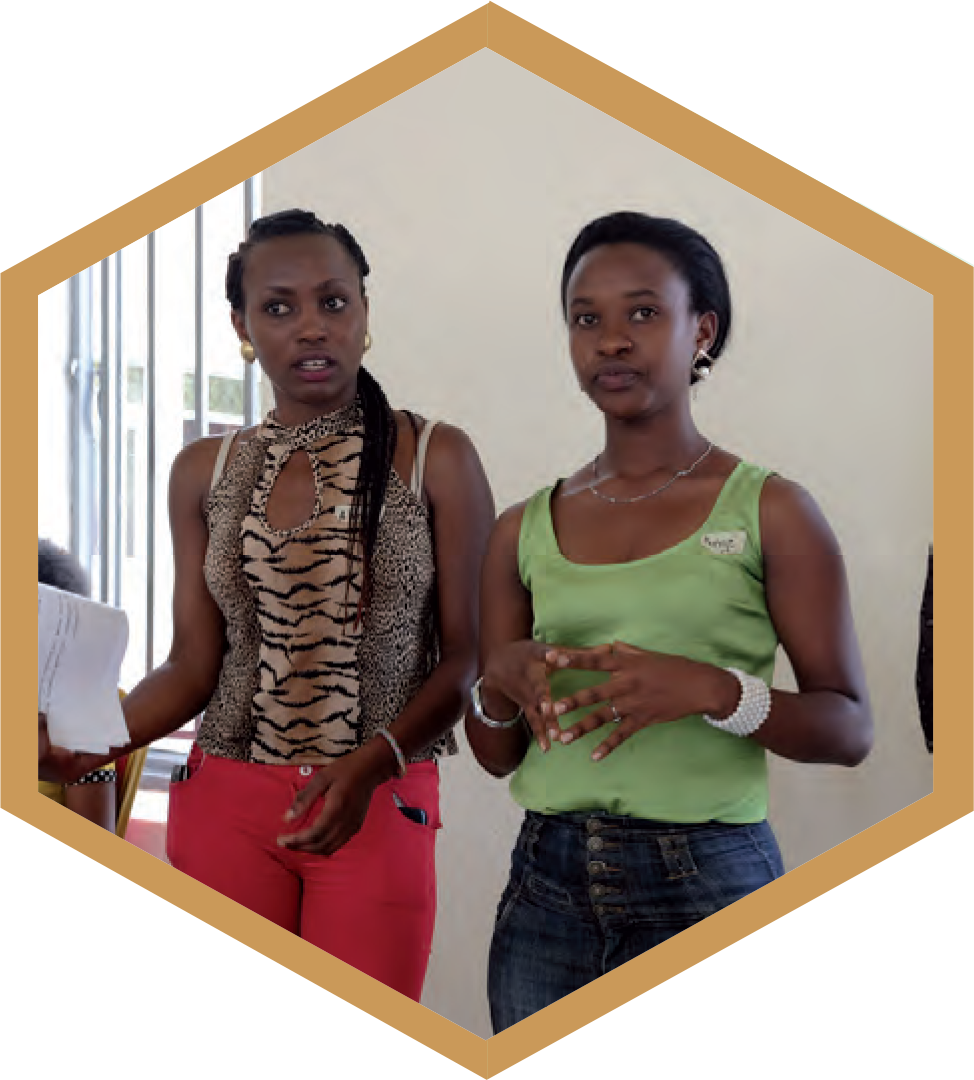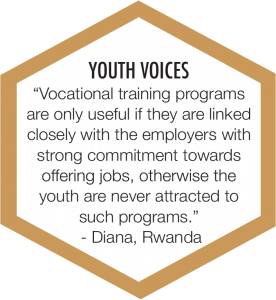Why Jobs for Youth in Africa?
Youth are Africa’s greatest asset. Africa’s population is 1.2 billion and is projected to more than double by 2050, when it will comprise one-fourth of the world’s population. Africa will remain the world’s youngest region, with the median age of the population under 25 years old. If properly harnessed, this growing working age population could drive Africa’s economic transformation.
However, the majority of youth do not have stable economic opportunities. Of the 420 million youth aged 15 to 35 in Africa today, the majority are unemployed, discouraged, or only vulnerably employed. Youth face roughly double the unemployment rate of adults, with significant variation across African countries.
The challenge is multifaceted. Only three million formal jobs are created annually despite the ten to twelve million youth that enter the workforce each year. The lack of wage jobs pushes youth into the informal sector, where jobs are typically less stable and have lower earnings potential. Women seeking both formal and informal jobs are particularly impacted, often facing even greater barriers to accessing opportunities: 35% of female youth are not in employment, education, or training (NEET), compared to only 20% of men.
Youth in fragile states face additional challenges, with economic opportunities diminished by instability and lack of institutional capacity. The costs of unemployment are pervasive and severe. Long spells of youth unemployment or vulnerable employment permanently lower future productive potential and earnings, and individuals with limited incomes have restricted access to health and education services. Limited economic opportunity can also fuel conflict and instability: 40% of people who join rebel movements worldwide are motivated by a lack of jobs.
It also drives migration out of the continent. In 2015, 14% of international migrants worldwide were born in Africa. Moreover, the number of migrants from Africa increased by 2.7% each year from 2000 to 2015. Above all, youth unemployment constitutes a failure to capitalize on one of the continent’s greatest assets: its large and growing population of talented young people.
Improving quality of life today and achieving inclusive growth to sustain these improvements in the future thus depends on addressing the youth employment challenge.

YOUTH VOICES
“When you get an internship, the first thing they tell you is to forget everything you learned at school. A university doesn’t mean anything in real life.”
– Rose, Rwanda
What is Jobs for Youth in Africa?
Jobs for Youth in Africa is a transformational effort to address the continent’s youth employment challenge. It will expand employment opportunities, strengthen human capital, and build durable labor market linkages. It aims to create 25 million jobs and impact 50 million youth over the next decade.
Jobs for Youth in Africa involves collaboration between the African Development Bank and key partners in the public and private sectors across Africa. The African Development Bank is uniquely positioned to deliver on this agenda.
Its engagement in regional member countries ensures that programming is aligned with country priorities and the needs of African youth.
AfDB also has programmatic, financing, and research tools at its disposal – along with the convening power to bring together key actors to coordinate action. Partners will be involved at the national, regional, and continent-wide levels and will include African governments, private sector companies, civil society organizations, and regional bodies.
While Jobs for Youth in Africa builds on other youth employment efforts and lessons learned, it is unique in
adopting an ecosystem approach. It addresses interrelated supply, demand, and linkage challenges to youth employment, deploys a range of policy, research, programming, and investment interventions, and focuses on working with a broad coalition of partners. It also pays particular attention to female youth and youth in fragile states.
This will enable Jobs for Youth in Africa to bring coherence and scale to youth employment and entrepreneurship efforts across the continent.

YOUTH VOICES
“ICT in school is all basic, it’s nothing that encourages creativity, it’s not hands-on.”
– Hasan, Egypt
How will Jobs for Youth in Africa achieve this ambition?
INNOVATION
Innovation activities incubate, assess, and scale promising policies and interventions:
INTEGRATION
Integration activities incorporate a youth employment focus into both the Bank’s systems and its engagement with regional member countries:
INVESTMENT
Innovation activities incubate, assess, and scale promising policies and interventions:
1
Build the Bank’s capacity to address job creation and employment through incorporation of youth employment considerations in monitoring and evaluation systems, Bank planning documents, and in Bank projects that have high employment potential.
2
Support countries throughout Africa in adopting policies and building institutions favorable to employment by elevating youth employment in strategic planning processes, guiding policymakers, and providing financial and technical assistance for policy reform and capacity development.
3
Launch flagship programs across the continent: Program models focused on MSME creation and skills development in high-priority sectors will be tailored to country contexts, implemented in partnership with the private sector, evaluated, refined, and scaled.
4
Create an Enabling Youth Employment Index that measures youth employment outcomes and enabling policies within countries over time.
5
Establish an Innovation and Information Lab that incubates new ideas, supports entrepreneurs, and conducts cutting-edge research.
6
Launch a series of Private Sector Challenge Prizes that provide financial rewards and incentivize private sector actors to develop high-impact, market-based solutions to employment and entrepreneurial challenges.
7
The Jobs for Youth in Africa Facility would be the primary public sector vehicle for financing JfYA. This resource envelope will consist of funding commitments from the Bank and external funders- including direct co-financing agreements with external funders for specific activities and the use of existing Bank funds and facilities. The Bank will leverage partnerships for activities that have a strong value proposition beyond the Bank, including: flagship programs, other projects that incorporate youth employment, the Enabling Youth Employment Index, the Innovation and Information Lab, policy support to RMCs, and private sector employment challenges tied to financial rewards.
8
This includes focused activities that will catalyze private sector investment to stimulate the employment and entrepreneurship ecosystem by:
Reducing financing risks by providing guarantees to financial institutions for on-lending to SMEs and supporting student loan finance programs to increase lending to students.
9
Expanding access to capital through investing in the Boost Africa Investment Fund,1 providing lines of credit to financial institutions for on-lending to SMEs, and making direct investments in businesses that drive youth employment;
How can Partners get involved?
The African Development Bank is calling on Development Partners, the Private Sector, Foundations and all stakeholders of Africa to get involved. Jobs for Youth in Africa offers interested partners tailored opportunities to engage:
Knowledge Generation & Incubation
Research and academic institutions, entrepreneurial networks, and others can share best practices and build the evidence base on promising interventions and also jointly incubate promising new solutions.
Job Linkages
Private sector employers can partner on specific programs and gain skilled labor to grow and expand their businesses.
Funding
Public, private, and philanthropic institutions can pool resources to coordinate efforts and maximize impact.
Program Design & Implementation
Private, public, and civil society organizations can provide inputs to program design and support implementation for key activities.
These partnerships will enable Jobs for Youth in Africa to achieve its ambitions and equip young people across the continent to realize their full economic potential.
Programs in Agriculture
- Creating new rural micro-enterprises,
- Equipping skilled youth to launch larger-scale agribusinesses, and
- Providing human capital for agro-industrialization.
Program in Industry
- Developing skills enhancement zones near industrial clusters to train workers for full-time roles with employers in these clusters.

Programs in ICT
- Strengthening digital literacy and computational thinking in secondary schools, and
- Developing coding academies that teach skills ranging from basic digital design to advanced coding languages.


